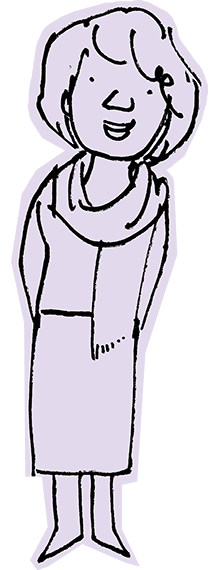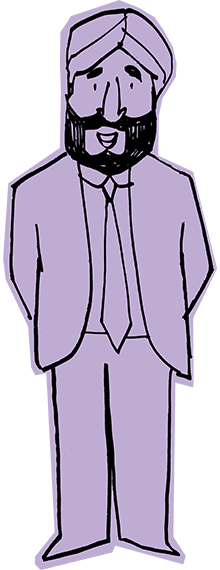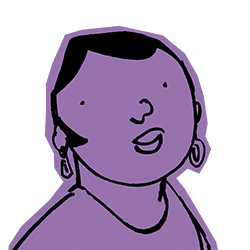Career map for the Psychological Professions
This map is all about career opportunities in the NHS psychological professions. Choose the character that best describes you or the qualification you are working towards. You can see what careers might be open to you. Find out more about any of the careers by clicking on the psychological professions.

Please click here if you hold a psychology degree.

Please click here if you hold a relevant degree that is not psychology.

Please click here if you hold a recognised professional qualification in mental health.

Please click here if you don't have a degree qualification.




An Overview
Are you interested in delivering guided self-help to adults with anxiety and depression? As a PWP you would be supporting people with a range of different low intensity cognitive behavioural therapy (CBT) methods over the telephone, on line or in person. These methods include written exercises, computerised packages and mobile phone apps. You would combine psychological practice with the very latest in low intensity CBT innovation, helping people move forward using structured, brief interventions.
An Overview
Are you interested in working with children and young people and their parents/ carers in education settings? As an EMHP you would assess and support children and young people with common mental health difficulties, particularly mild to moderate symptoms of anxiety, depression and behavioural difficulties, offering short-term cognitive-behavioural approaches. You would also support schools in promoting mental health within the school community, and providing information workshops on mental health and wellbeing.
An Overview
Are you interested in working with children and young people and their parents/carers? As a CWP you would assess and support children and young people with common mental health difficulties, particularly mild to moderate symptoms of anxiety, depression and behavioural difficulties. You would offer a range of interventions that are based on cognitive behavioural therapy and guided self-help.
An Overview
Are you interested in providing wellbeing-focused psychologically informed interventions and coordinate care plans for adults with severe mental health problems? Mental Health and Wellbeing Practitioners (MHWP) are based in the community and have an important role in supporting adults of all ages to help them live fulfilling lives.
An Overview
Are you interested in delivering psychologically informed interventions to support young people with severe mental health difficulties? Based in inpatient and intensive home treatment services, you’ll have an important role in supporting young people towards recovery and helping them to live fulfilling lives. You’ll work as an integral part of a multidisciplinary team where you will form collaborative relationships with young people and their families.
An Overview
Are you interested in working with children or adults to come to terms with issues like depression, bereavement, relationship difficulties, sexual issues, diversity issues, child abuse and trauma? Counselling offers people a safe and confidential space to talk about their feelings and concerns and as a Counsellor you would help people to understand themselves better and find their own solutions and make positive changes. Counselling can draw on a range of different methods and always prioritises the relationship between counsellor and client.
An Overview
Are you interested in working with children and young people with severe mental health difficulties and their families? As a CAPT you would work in NHS-funded Teams in the community and in hospitals, and with all types of psychological difficulties. You would use specialist psychoanalytic skills to assess and treat children, their families or carers, through a combination of talking, playing and drawing.
An Overview
Are you interested in working with children or adults with mental health difficulties? As a CBT Therapist you would assess and support people using cognitive behavioural therapy (CBT). CBT is a talking therapy which aims to help people overcome emotional difficulties by changing the way they think and behave. As a CBT therapist you would address common mental health difficulties like anxiety and depression, or less common issues like psychosis, a personality disorder diagnosis, or eating disorders. You may work with individuals, couples or groups.
An Overview
Are you interested in working with adults to overcome a wide range of emotional or mental health issues? As an Adult Psychotherapist you would provide talking therapy, helping people to change the ways they think and behave or find better ways to cope. You would address common mental health difficulties like anxiety and depression, or complex issues like psychosis or a personality disorder diagnosis. You may work with individuals, couples or groups.
An Overview
Are you interested in working with children or adults from the perspective of or with the involvement of families or groups? As a Family and Systemic Psychotherapist you would use psychological approaches to create a shared map of difficulties and challenges, which would guide the therapies and interventions you would provide, usually involving several members of a family. You might work with specific populations like looked after children, people with learning disabilities or people with dementia.
An Overview
Are you interested in working with people to overcome a wide range of emotional or mental health issues using a creative approach? As an Art, Drama or Music Therapist you would use art music or drama as part of a therapy process. Art , Music, and Drama Therapists work across a range of service settings and age-groups and work with people with a range of needs including emotional, behavioural or mental health problems, learning disabilities, or physical illnesses.
An Overview
Are you interested in training in a model of specialist psychological therapy to support people with specific mental health difficulties? A range of options are available for individuals with an existing mental health professional qualification to train in the delivery of specialist psychological therapies (for some trainings this needs to be a psychological professional qualification or even an existing psychological therapy qualification). These opportunities include Dialectical Behaviour Therapy (DBT), Dynamic Interpersonal Therapy (DIT), Interpersonal Therapy (IPT), Cognitive Analytic Therapy (CAT) and Eye Movement Desensitisation and Reprocessing (EMDR). Note: some other groups of psychological therapists are listed elsewhere in this career map (e.g. CBT Therapists, Child and Adolescent Psychotherapists, Adult Psychotherapists, and Family and Systemic Psychotherapists).
An Overview
Are you interested in making the population healthier? As a Health Psychologist you would help people respond to and manage the psychological and emotional aspects of health and illness. You would encourage people to improve their health by promoting healthy lifestyles and supporting people in managing chronic illness or pain. You would also use your skills to improve the healthcare system, such as finding the best ways for professionals to communicate with patients.
An Overview
Are you interested in working with children or adults across the lifespan, and the systems around them including professionals, organisations, and communities? As a Counselling psychologist you would work with a wide range of psychological issues including the most complex or acute presentations in mental health, social care, education, physical health, and forensic settings. Counselling Psychologists strive to reduce distress and improve people’s functioning.
An Overview
Are you interested in working in psychological healthcare for offenders? This can include working with offenders in areas like sexual offending, violence and aggression, and drug or alcohol abuse. As a Forensic Psychologist you would explore how psychological challenges can be associated with criminal behaviour and offer treatment in order to help people who have been involved in the criminal justice system rehabilitate into the community. You might also be working with staff, prisoners or people in secure hospitals responding to their changing needs and working to reduce stress.
An Overview
Are you interested in working with adults or children as well as teams and services to formulate solutions based on psychological theory and evidence? As a Clinical Psychologist you would work with clients using psychological knowledge to create unique approaches to solving problems. You would be a scientist practitioner and a reflective practitioner - applying research principles and reflection to make your work effective. You would also supervise, train and support other professionals and teams, undertake research to develop, evaluate and improve psychological interventions and services.
An Overview
Are you interested in working with a specific population, supporting people who have longstanding and complex difficulties? As a Clinical Associate in Psychology, you’ll use psychological theory and evidence to find the best interventions to meet their needs. You will conduct research and use tools to evaluate psychological interventions and improve the quality of clinical practice.
An Overview
Are you interested in supporting people with mental health difficulties? As an Assistant Psychologist, you’ll provide clinical support under the direct supervision of a qualified psychologist. Assistant Psychologists often work as part of a multi-disciplinary team and may be involved with undertaking assessments, research and contribute to multidisciplinary discussions about a client's diagnosis, treatment, risk assessment and care plan issues. You will also maintain clear written records, compile reports and draft letters to clients and other professionals.
